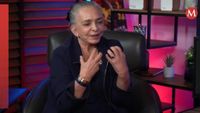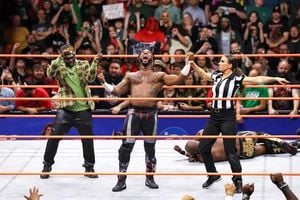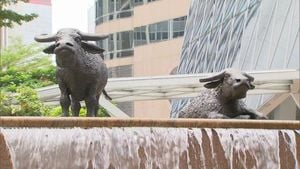Ana Martín, a celebrated actress from the golden age of Mexican cinema and television, has recently unveiled a lesser-known chapter of her career that reveals the complexities of power and personal choice in the entertainment industry. In a candid interview on Yordi Rosado's popular YouTube channel, Martín recounted a dark period in her life when she was effectively blacklisted from the film industry for five years after rejecting an invitation from then-President Luis Echeverría.
The incident occurred during a movie premiere party, where Echeverría made an unexpected appearance. According to Martín, the atmosphere changed dramatically with the president's arrival, prompting her and her friends to leave the festivities early. "I decided to go to my room to sleep; the party was over for us," she recalled. However, the night took an unexpected turn when she received a phone call at dawn from Echeverría himself.
"Hello, how are you? This is Luis Echeverría. I invite you to Los Angeles on my plane, will you come with me?" he said, according to Martín. Her response was swift and firm; she felt it was disrespectful for the president to call her at such an hour without prior notice. "I told him, 'You are disrespecting me because I didn't tell you what room I was in, and you shouldn't be calling me at this hour, let alone asking me to go with you.' Then I hung up," she explained. This decisive rejection led to her being placed on a blacklist that barred her from working in film for five years.
During this challenging time, Martín found solace and support from her peers, particularly from actors Pepe Estrada and Ignacio López Tarso, who stood by her. "I only managed to do one film during that time, thanks to them," she said, reflecting on her gratitude for their assistance.
Fortunately for Martín, her career was resurrected through the intervention of Emilio Azcárraga Milmo, the influential head of Televisa. Upon learning of her situation, Azcárraga reached out to help her re-enter the entertainment landscape. "He told me, 'Ana, do you realize it's the president? You could have anything you want, but you’re in love with an intellectual with long hair. Very bad. Let me connect you with Ernesto Alonso. I have someone here who is crazy; you can put her in all the soap operas,'" Martín recounted, highlighting the pivotal role Azcárraga played in her comeback.
With Azcárraga's support, Martín returned to the screen, becoming a staple in numerous telenovelas and solidifying her legacy in Mexican television. Her story exemplifies resilience and the intricate relationship between personal choices and professional consequences in the entertainment industry.
In addition to discussing her career, Martín also shared a personal anecdote about her father, Jesús Martínez Rentería, known as 'Palillo,' a beloved comedian. She revealed that he faced life-threatening situations due to his political humor. During one of his performances, he was shot while heading to Café Tacuba in Mexico City. Despite being aware of who was responsible, he chose not to speak publicly about the incident, stating, "I won’t give them the satisfaction of knowing they affected me." This anecdote not only underscores the dangers faced by artists who challenge political figures but also highlights the cultural landscape in which they operate.
Martín's revelations have sparked diverse reactions across social media and news platforms, with many praising her courage for sharing her experiences. The controversy surrounding Echeverría's presidency and the implications of political power in the arts have reignited discussions about the responsibilities and risks faced by artists in Mexico.
As she continues to work in the industry, participating in projects like La Rosa de Guadalupe, Ana Martín remains a prominent figure in Mexican entertainment. Her journey serves as a reminder of the challenges artists face and the often-unseen forces that shape their careers.
In a world where political and artistic realms frequently intersect, Ana Martín's story is a powerful testament to the strength of personal conviction and the enduring impact of resilience in the face of adversity.








